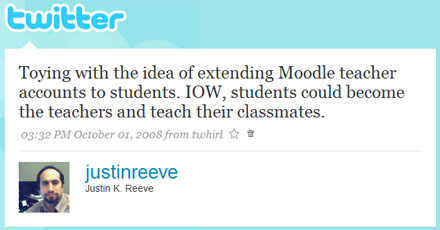Turning Students Into Teachers with Moodle
I’ve noticed a few differences in how our teachers and students use Moodle. The details may vary, but in general a teacher will log in, maybe upload a PowerPoint document, and if they’re adventurous they’ll set up an online quiz, and possibly a forum.
A student, on the other hand, logs in, and explores everything. One of the first things they’ll notice is their Profile page. They’ll edit their profile, upload a photo of themselves, and may even get creative and embed a cool Flash widget they like. Then they’ll pop into the class forum and post a message. They will return to this forum a few times throughout the day to continue talking to their classmates. They will then download the teacher’s course material, study it, and take the teacher’s quiz that’s been set up. They may then return to the forum to see if anyone responded to their messages, and maybe post another message to someone else, before uploading their daily homework assignment.
 See a pattern here? Students are the power users. The technology is familiar to our “digital natives,” and they enjoy using it. Some of our students have even panicked when the technology wasn’t available. Once our Moodle server went down for a reboot, and was offline only about 2 minutes when I received an IM from a teacher. She said the students were freaking out and asking “When will Moodle be back up?”
See a pattern here? Students are the power users. The technology is familiar to our “digital natives,” and they enjoy using it. Some of our students have even panicked when the technology wasn’t available. Once our Moodle server went down for a reboot, and was offline only about 2 minutes when I received an IM from a teacher. She said the students were freaking out and asking “When will Moodle be back up?”
So I had a thought the other day:
Teachers can manage classes in Moodle, but why not students? People often learn best when they teach, and it seems like we’re only targeting half our potential audience here. We could turn the students into teachers, and let them teach their classmates. It would be a great way to create effective learners.
A teacher could use this as a classroom activity. They could assign students to “teach” a particular topic they’re studying in class, and the student could create video presentations, quizzes, wikis, and other course material in their own Moodle course. They will become better learners through teaching, and we will be preparing them for college by introducing them to their online classroom space.
Not Just for In-Class
 But online student-teaching could extend beyond the classroom as well. Under the sponsorship and mentoring of a teacher, a student could teach about any subject that interests them, whether it be athletics, books, auto repair, video games, woodworking, painting, animation, music, and more. Imagine a whole network of students teaching about a diverse range of topics. Other students could browse the available courses their peers are instructing, enroll, and contribute to a system where student interests and knowledge are shared in a constructive, educational manner. Moodle could become the focal point of a vibrant student learning network.
But online student-teaching could extend beyond the classroom as well. Under the sponsorship and mentoring of a teacher, a student could teach about any subject that interests them, whether it be athletics, books, auto repair, video games, woodworking, painting, animation, music, and more. Imagine a whole network of students teaching about a diverse range of topics. Other students could browse the available courses their peers are instructing, enroll, and contribute to a system where student interests and knowledge are shared in a constructive, educational manner. Moodle could become the focal point of a vibrant student learning network.
A rewards system may provide an added incentive to this “Young Teachers” program. Example: for every student that signs up for a course, the student-teacher earns points. If enrollees pass the course by taking an exam, the student-teacher earns even more points. Those who pass a student-made course could earn “attendee points” and receive certificates for passing. At the end of the year, we could give out prizes for those who’ve earned the most points, or hold an awards ceremony to recognize the best student-teachers.
With the right motivation, we would have no problem finding students interested in teaching their own classes.
Is This Really “Educational?”
The very nature of having students teaching courses is educational, because we’d be placing them in managerial roles as they organize their online classrooms. They would set up their course how they want, determine the best method of teaching and presenting the material, and create quizzes to make sure the other students understand what they are teaching. They could even organize activities through their online classroom. For example, a student teaching a class on theatre arts could set up a date to have everyone attend a local play. A student teaching a class on poetry could set up an online chat session with an English professor his family knows. There are numerous possibilities here.
At the same time, some questions need to be asked. Since this may be extracurricular for students, do we need to worry about keeping all student-taught courses within the state core curriculum? Also, it might not really be considered “educational” to let students teach a class on, e.g., video games, and just discuss strategies for Halo 3, when they could be teaching concepts of video game design and providing helpful tutorials and tools for independent game development. Clear goals should be outlined and standards set forth, so the teacher mentors can guide the students toward education-appropriate courses.
Benefits
- Students would become more actively involved in the educational process, both on the receiving and giving end.
- We would be preparing students for college by promoting self-directed learning, and introducing them to the online class environment.
- Studies have shown that online learning opportunities can encourage even the normally reticent students to participate in class.
- The beginnings of a student learning network would be created.
- Students would develop organizational leadership skills.
- Students would earn the recognition of their teachers, parents, and peers.
- Students would find it motivating and empowering to maintain their own online classroom about a subject that interests them.
- Students would have a valuable portfolio of their work.
- Parents could visit their student’s course and follow the progress.
Teacher Mentors
Each school could have one or two teacher mentors for these student-created courses. They would be responsible for the following:
- Hearing and approving student course requests.
- Creating the student course in Moodle.
- Making sure students understand the rules for their course, such as appropriate behavior (no offensive material or language) and resources they can use, breadth requirements for the “passing” exam, etc.
- Being available for questions about appropriate course material and helping students with extracurricular activity planning if necessary.
- Periodically checking up on the students’ courses.


Hi Justin,
When I was in the classroom, I did set up a few students as limited teachers giving them moderation permissions in forums. The way I had it set up was with students enrolled in an independent study class who taught a few of the lessons in an online format. It was a great experience for them (and me) as we worked out the most appropriate way for them to interact with each other. If you move forward with this I hope to hear more about it and your experiences.
Thanks for sharing.
I’m glad to hear this worked for you, and I’d love to hear more about the successes and pitfalls you ran into. You basically did the same thing I’m proposing here. I’m hoping we can work out the few kinks, such as student supervision policies, legal issues, and whether the model I summarized here is still the best idea. This will still require more conversations.
One technological focus in our school district this year will largely be on student applications, and how we can engage students to use these tools for learning. I think this could be a great means to an end.
Amazing that I had just blogged about a similar topic…
What do kids do now that teachers USED to do because of technology?
Tim
El Paso
Justin,
This lines up really well with what Alan November talks about when he discusses the six jobs for students in a class (http://novemberlearning.com/index.php?option=com_content&task=view&id=290&Itemid=85). I can see Moodle, or another LMS, covering the jobs of: Tutorial Designer, Official Scribe, Researcher, Collaboration Coordinator, and Curriculum Reviewers.
What is really exciting is to see how students really start to get involved and start to push themselves. For many years teachers have used similar strategies in the classroom, it is only a question of when it moves online.
Great post, Justin. I think it would be a real coup if you had students offering online sessions in MySpace or Facebook or similar tools where parents could log-in and learn about them. Who better to teach the kids? Killer idea, and keep us in mind for sharing their work. If we can encourage any of our students to join the fray, we’ll share post and Tweet about it to share them.
Enjoyed talking with you today! Sorry I had to step out for a minute or so. I look forward to working with you guys more in the future.
Thanks for the chat earlier! I certainly look forward to hearing more about the exciting things you’re doing, too.
What a great idea, about creating an interdistrict student teaching network! I was still thinking inside the box, and just proposing we let our own district’s students do the teaching, but if we could develop a system that’s open to students in other districts, that would REALLY be something.
Facebook does have quite a few educational applications that would be suited to this, but as long as we’re blocking Myspace and Facebook here it won’t be the best option. However, the Moodle Network feature might be a viable alternative, though I haven’t really had a chance to mess around with that before. I’ll have to give it some thought, but ultimately it would be up to our upper management whether or not we’ll be able to do any of this, especially joint projects with other districts.
Thanks for the comments!
Look forward to working with you. Collaboration is at the top of the list of the work force skills. Virtual collaboration is a must. It seems as though the folks in India have it down pat.
Another great post. I am going to be reading and reviewing your blog, Justin. This post is filled with helpful information for me to use in my proposal on adding Moodle as an optional Learning Management system for Boise State.
Thanks again for your positive contributions to the field of education.